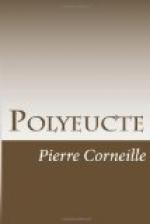|
This section contains 5,151 words (approx. 18 pages at 300 words per page) |

|
SOURCE: Cairncross, John. “Polyeucte: A Flawed Masterpiece.” Papers on French Seventeenth Century Literature 9, no. 17 (1982): 571-90.
In the following essay, Cairncross underscores the flaws in Polyeucte and traces the critical reaction to the play throughout the years.
For the last forty years, critics have placed Polyeucte (? 1642) on a pinnacle. The wave of enthusiasm can be traced back to Péguy's famous essay, Victor-Marie, comte Hugo (1910). But the groundswell of enthusiasm starts, significantly, just before the Second World War with Brasillach's Corneille (1938), where he defines the work as the greatest sacred drama of France, “the one in which all virtues, human or divine, are blended. Truly, the whole of Christianity is here.” Monseigneur Calvet, whose commentary on the play comes four years later, is unremittingly dithyrambic. In 1949, Francis Ambrière has no hesitation in assuring his readers that it is “the greatest religious play in the world” (in English). Since...
|
This section contains 5,151 words (approx. 18 pages at 300 words per page) |

|


